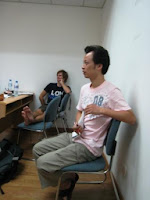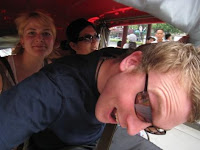After a month without updates, I'm sorry. I hope this post will give a little insight into what I have been up to lately. And why I have been absent from posting.

On the 22nd of August we had our exam in Nanjing. It was a fairly easy test without the biggest of challenges. However, we didn't know that beforehand, so we studied to the best of our ability, and became smarter for it. Allthough, this studying did result in a lack of updates on my blog. We had two tests, one written and one oral. The oral one was the most fun, it involved talking about norwegian eating and drinking habits, not too difficult, but after all, it was only a summer course. I expect the exam in Desember to be more of a challenge. (Picture no.1: Our teacher during the oral exam of one of my classmates, in the background Fredrik is relaxing before his turn)

The day after my exam it was time to get out of Nanjing and on to further adventures. Me, Nils, Jenny, Siv and Julie stuffed together in the back of a couple of cabs and shouted: "To the railway station" And then the driver replied: "Eh?!?". Still, after two months in China, the simplest of messages sometimes gets lost in translation... Anyways, after repeating the message he quickly nodded, grunted and set the car in motion. After getting to the station we had to orientate ourselves and locate the closest ticket-office. It is always outside the station building, so don't try to get inside without a ticket. Riding the train in China will unavoidably involve massive numbers of people, as pretty much everywhere else, but the train-stations definately seem worse. We got tickets on the first train destined for Suzhou, about 1,5 hours away. However, they only had standing tickets left, something which really wasn't that much of a problem, so we loaded ourselves aboard, at 67 Yuan per. head.

Arriving in Suzhou we quickly had the questionable honor of getting to know the local traders, that is; people walking up to you selling merchandise and services of different kinds. One advice; learn to say the phrase: "不要"(bu4yao4). This means, "I don't want it", very useful in pretty much any turist area predominantly inhabited by Chinese merchants selling tourist stuff. Another advice; look for the long line of people, that'll be where you find the taxies. If you don't get in line you'll be approached by people wanting to drive you in private cars, this however is usually never a good idea as you never know how much they'll demand from you or where they'll drive you. Go for the official ones, even though it might involve a little waiting. After getting inside the car have you cell-phone ready, it the driver doesn't understand the address it is always a good idea to call the hostel and have them explain the way to him/her. (Picture no.2: The taxi-line outside of Shanghai-south train station. Same principles as in Suzhou applies, except the line moves faster)

In Suzhou we stayed at beautiful little hostel called
Watertown Hostel. It was a great place where we paid 50 Yuan a night in a 6-man dorm. Suzhou is know for its beautiful gardens and canals. For the short time of two days we got around to se quite a lot of them, and they really were beautiful. Additionally we enjoyed great food, relaxing books in the hostel's reading lounge and wandering around town finding good spots to sit and chat. Alltogether it was a very good stay:)

However, it was not as beautiful as our next destination, Hangzhou. This is the number one travel destination for Chinese tourists, situated only two hours by train from Shanghai. Found in thousands of poems, stories and paintings up through the long Chinese history. We ate even better food, went to even more beautiful gardens and crossed the fantastic "West lake". The place we stayed though, a hostel called Mingtown, was not good. If you wanted nice rooms you had to pay double the price you have to pay in big cities like Shanghai, the room had all the bells and whistles as well; cockroaches and mould. But all in all, go to Hangzhou if you can, just find a better hostel.

After Hangzhou we returned to Shanghai where we stayed until the 1st of September when we boarded the night train to Beijing. Shanghai was just as expected, fun and relaxing at the same time. After much travelling all I needed was to relax and enjoy a good book, a little sightseeing and good food. I got all that. First I found a bookstore that sold a book by Amy Tan called "the kitchen god's wife" that I had started reading in the common room at the hostel in Suzhou. I bought it and finished it in about two days before I went on to read "What does China think?" by Mark Leonard, the author of "Why Europe will run the 21st century". I can highly recommend both books allthough I would first read Amy Tan's "The joy luck club" if you haven't allready.
We stayed at a place called
Blue Mountain Youth Hostel, the best hostel so far. It was convenient, clean, and had excellent staff members. In the evenings we explored the city and at night we slept, all in all very relaxing. The best experience in Shanghai was definately
"The French Concession". This place is filled with quaint little cafè's, small art stores and stalls. If you ever go to Shanghai, this is the place to go! Other than that I guess my best advice is to skip the expensive trip to the to one of the downtown towers and rather find an expensive hotel with a bar on the top floor, sneak in, and enjoy the view for free:)
After arriving in Beijing I have been spending my time looking for apartements, getting used to a high workload and finding good places to study and use the internet. Right now I'm sitting at a popular student hang-out spot called
The Bridge, which is right around the corner from were I live. Updates will follow, just not as often as in Nanjing:)












